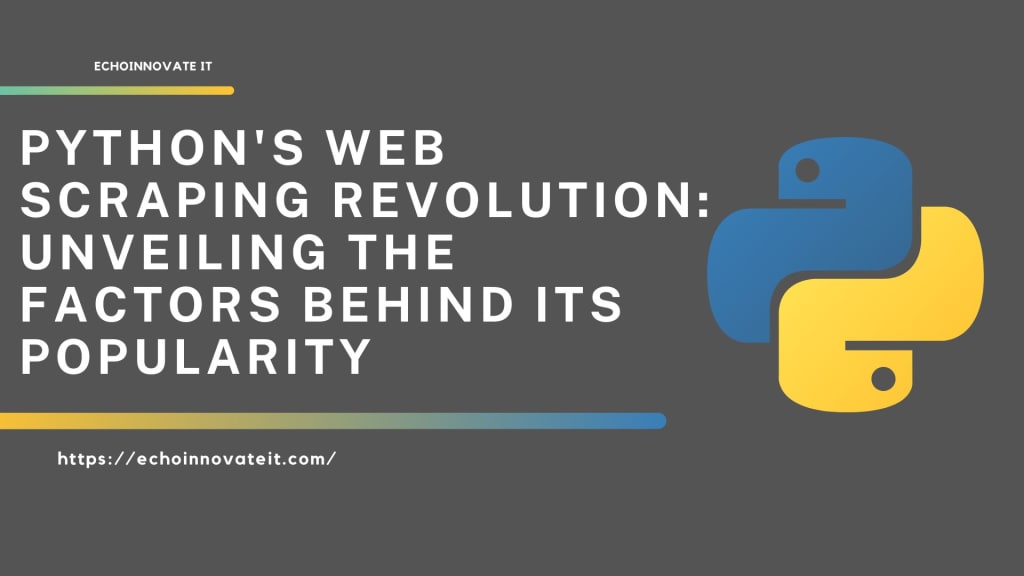Python's Web Scraping Revolution: Unveiling the Factors Behind its Popularity
Python's Web Scraping Revolution

Web scraping, the process of extracting data from websites, has become an essential tool for various industries. Python has emerged as the go-to programming language for web scraping, and its popularity in this domain continues to soar. In this article, we will explore the reasons behind Python's dominance in web scraping, highlighting its versatility, ease of use, rich ecosystem, and powerful libraries. By understanding the strengths of Python, we can grasp why it has become the preferred choice for web scraping enthusiasts and professionals alike.
Versatility and Ease of Use
One of the primary reasons for Python's popularity in web scraping is its versatility and ease of use. Python boasts a simple and readable syntax, making it accessible to both beginners and experienced programmers. Its intuitive nature allows developers to quickly grasp the concepts and build robust scraping scripts.
Python's versatility extends beyond its syntax. It supports multiple programming paradigms, including procedural, object-oriented, and functional programming, giving developers the freedom to choose the approach that best suits their scraping requirements. This flexibility enables them to write clean and efficient code, enhancing the overall scraping experience.
Furthermore, Python's versatility extends to its cross-platform compatibility. It runs on major operating systems, such as Windows, macOS, and Linux, enabling users to seamlessly execute their scraping projects across different environments. This flexibility reduces barriers to entry and increases the adoption of Python for web scraping.
Rich Ecosystem
Python enjoys a thriving ecosystem of libraries and frameworks that greatly facilitate web scraping tasks. The most notable library is BeautifulSoup, which provides powerful tools for parsing HTML and XML documents. It simplifies the extraction of data by providing a convenient interface to navigate the document structure effortlessly.
Another widely used library is Scrapy, a comprehensive web scraping framework. Scrapy offers a complete solution for building scalable and efficient web scrapers, with built-in features such as request management, item pipelines, and concurrency. Its modular design allows developers to extend its capabilities to suit their specific scraping needs.
Moreover, Python's ecosystem extends beyond scraping-specific libraries. With popular data manipulation libraries like pandas and NumPy, analysts can effortlessly process and analyze scraped data. These libraries offer advanced functionalities for filtering, transforming, and aggregating data, empowering users to extract meaningful insights from the extracted web data.
Additionally, visualization libraries like Matplotlib and seaborn allow for easy data presentation, enabling users to create visually appealing charts, graphs, and plots based on the scraped data. These visualization capabilities enhance the communicative power of web scraping results, making it easier to convey key findings to stakeholders.
Powerful Third-Party Libraries
Python's web scraping dominance is further bolstered by a plethora of third-party libraries that extend its capabilities. Selenium, a widely used library, enables scraping of dynamically generated content and interaction with JavaScript-driven websites. It facilitates web scraping scenarios that require user interaction, such as filling forms, clicking buttons, and navigating through pages.
Requests, a versatile HTTP library, simplifies the process of making HTTP requests and handling responses. It provides an intuitive API for sending GET and POST requests, handling cookies, and managing authentication, thus streamlining the scraping workflow.
In addition, libraries like Scrapy-Splash and Pyppeteer integrate with headless browsers, enabling scraping of websites that heavily rely on JavaScript rendering. These libraries ensure compatibility with modern web applications and enhance the scraping capabilities of Python.
The availability of these powerful third-party libraries allows Python developers to tackle complex scraping challenges effectively. They provide ready-made solutions and abstractions that abstract away the complexities of web scraping, enabling developers to focus on the core aspects of their scraping projects.
Active Community and Learning Resources
Python boasts a vibrant and supportive community that actively contributes to the development of web scraping resources. Online forums, such as Stack Overflow and Reddit, provide platforms for developers to seek assistance, share knowledge, and collaborate on scraping projects. The community's collective expertise helps in resolving issues, offering insights, and discovering innovative approaches to web scraping.
The availability of extensive learning resources, tutorials, and documentation also plays a significant role in Python's popularity for web scraping. Numerous online courses, books, and video tutorials are tailored to help individuals master web scraping using Python. These learning materials provide step-by-step guidance, practical examples, and real-world use cases, allowing users to develop a comprehensive understanding of web scraping techniques and best practices.
Python's active community and abundant learning resources ensure that users can quickly overcome challenges and expand their web scraping expertise. As a result, individuals from various backgrounds, including data scientists, researchers, journalists, and business analysts, can leverage Python's capabilities to extract valuable data from the web efficiently.
Related Blog:
Conclusion
Python's popularity in web scraping is not a coincidence but a result of its exceptional qualities. Its versatility, ease of use, rich ecosystem of libraries, and powerful third-party tools make it an ideal choice for scraping tasks. Python's ability to handle various web scraping scenarios, including dynamic content, JavaScript rendering, and large-scale projects, positions it as the preferred language for extracting valuable data from the web. As the field of web scraping continues to evolve, Python's dominance in this domain is likely to persist, supported by its robust community and constant innovation. With Python's continued growth, web scraping will continue to be a powerful technique for accessing and analyzing data from the vast realm of the internet.
About the Creator
Echoinnovate IT
Echoinnovate is a leading mobile app development company that offers custom app development services to clients across various industries.






Comments
There are no comments for this story
Be the first to respond and start the conversation.